 When registration opened last November 16 for BookPeople's two literary summer camp programs this year, some parents camped out overnight at the store in Austin, Tex., to make sure their children got a spot. Camp Half-Blood, BookPeople's flagship camp program--based on Rick Riordan's Percy Jackson & the Olympians series and in its ninth year--sold out all seven of its week-long sessions within hours. The other camp, the Ranger Corp Training Camp, based on the Ranger's Apprentice series by John Flanagan, which has been around since 2008, is nearly sold out. With 100 kids in a session, altogether BookPeople signed up some 800 children for this coming summer's camps. Each spot costs $450.
When registration opened last November 16 for BookPeople's two literary summer camp programs this year, some parents camped out overnight at the store in Austin, Tex., to make sure their children got a spot. Camp Half-Blood, BookPeople's flagship camp program--based on Rick Riordan's Percy Jackson & the Olympians series and in its ninth year--sold out all seven of its week-long sessions within hours. The other camp, the Ranger Corp Training Camp, based on the Ranger's Apprentice series by John Flanagan, which has been around since 2008, is nearly sold out. With 100 kids in a session, altogether BookPeople signed up some 800 children for this coming summer's camps. Each spot costs $450.
"We do all the regular camping stuff--archery, swimming and all that," said BookPeople owner Steve Bercu. "But we're fully committed to the books themselves."
 Each session, and each summer, follows a tightly structured plotline based on the respective book series upon which the camps are based. Every activity the campers are involved in--from hiking and swimming to archery and lessons on Greek and Roman mythology--ties back into that session's story. The programs also feature actors, some of whom double as counselors, along with elaborate costumes and sets. The Camp Half-Blood program has gone on long enough to have a counselor-in-training program for teens aged 16-18, and there are graduates of that program who now work as counselors.
Each session, and each summer, follows a tightly structured plotline based on the respective book series upon which the camps are based. Every activity the campers are involved in--from hiking and swimming to archery and lessons on Greek and Roman mythology--ties back into that session's story. The programs also feature actors, some of whom double as counselors, along with elaborate costumes and sets. The Camp Half-Blood program has gone on long enough to have a counselor-in-training program for teens aged 16-18, and there are graduates of that program who now work as counselors.
"At this point, there are literally several thousands of graduates of these camps," said Bercu. "Everybody gets a T-shirt; it's not uncommon to see kids between the ages of 11 and 20 wandering around Austin with an orange Camp Half-Blood T-shirt."
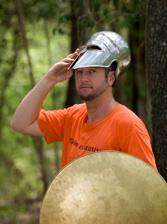 |
| Topher Bradfield |
The man behind Camp Half-Blood is Topher Bradfield, who has worked at BookPeople since April 2005. He began as a children's bookseller; he started BookPeople's internship program and held book talks and performances at nearby schools in his free time. Now, Bradfield holds the dual position of literary camp director and children's outreach coordinator.
The idea to start Camp Half-Blood came after a reading in February 2006. "We used to do readings on Friday nights in the kids' amphitheater at the store," recalled Bradfield. "Around February, we got an advanced copy of the second book [in the Percy Jackson & the Olympians series, The Sea of Monsters]. We set it up so we could read the whole book out loud. We started at 5:30 or 6:00 and performed the whole book. Kids stayed for the whole thing. Afterward, I said, 'Wouldn't it be great if Camp Half-Blood were a real place?' They looked at me like I was crazy and said, 'Well, yeah.' Then I thought, let's see if we can try to put this together."
Bradfield approached Bercu and after a discussion, Bercu came up with a budget and gave him the go-ahead. From February to May, Bradfield developed a story, planned activities, and got the approval of the series' publisher and author. Although he had gone to summer camp as a kid, Bradfield had no professional experience in the area, which he said was overall an advantage.
 He consulted with a camp director friend to get the basics of running a camp that was safe and fit within state regulations, but otherwise didn't look to camping professionals for advice or for a template to follow. "I've since found out from other camps that what we do flies in the face of what everybody thought could work," he said. "I've been told again and again that it shouldn't work, that these themed camp things don't last."
He consulted with a camp director friend to get the basics of running a camp that was safe and fit within state regulations, but otherwise didn't look to camping professionals for advice or for a template to follow. "I've since found out from other camps that what we do flies in the face of what everybody thought could work," he said. "I've been told again and again that it shouldn't work, that these themed camp things don't last."
The first Camp Half-Blood was held at a city park in Austin. Author Rick Riordan, who is from San Antonio, showed up and presided over the opening "claiming ceremony" (he continued to visit the camp for the next several years, until he moved to Massachusetts). The goal of the first year, Bercu said, was to gauge interest. Bercu and Bradfield deemed the first summer successful enough to warrant expanding Camp Half-Blood into a full program with multiple sessions.
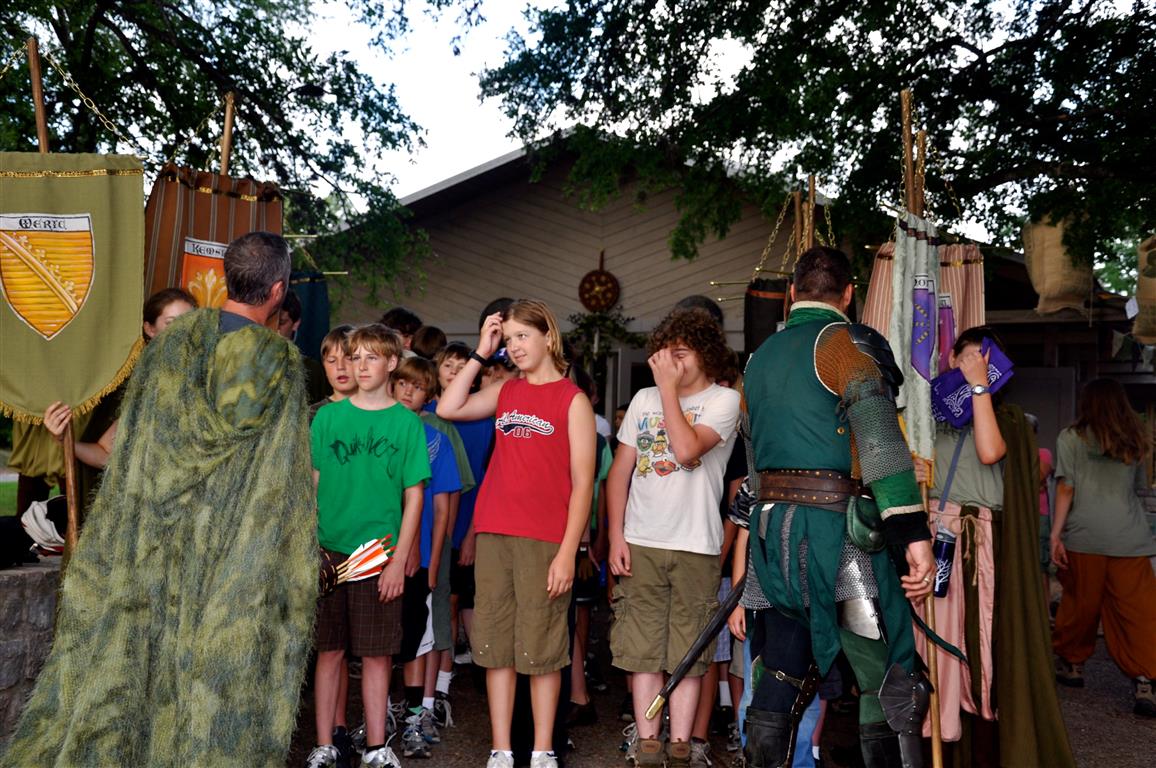 |
| Ranger's Apprentice campers |
Today, Camp Half-Blood is a "totally different beast," Bradfield said. The focus on an over-arching narrative and dedication to the source material has remained the same, but everything else has evolved. It's held at a state park; activities include gladiatorial and phalanx combat training, among other options; and there are performances with actors, costumes and special effects. The Ranger's Apprentice camp is held at the same state park and follows a similar method, but on slightly smaller scale (it is open for one session each summer; Camp Half-Blood does seven) and of course draws from a different mythos.
"Everything we do is woven around the camp's narrative," Bradfield stressed. "We've built up a wonderful tapestry and store of camp mythology. We never repeat anything."
 |
| Star Wars campers |
Since the success of Camp Half-Blood, Bradfield has consulted with other bookstores looking to start their own programs, as well as traditional camps. Crystal Bobb-Semple, the owner of the now-closed Brownstone Books in Brooklyn, N.Y., has started her own Camp Half-Blood; Bradfield helped her avoid the "pitfalls" that he encountered along the way. He has also consulted with Diane Capriola of Little Shop of Stories in Decatur, Ga., and had booksellers from Boulder Book Store in Boulder, Colo., shadow him at the camp last year.
"I'm delighted that there are other places bringing this kind of magic and fun and literacy to kids," Bradfield commented.
"All I can tell you is that the program has been wildly successful in every conceivable aspect," said Bercu. "It has been great for our involvement in the community. It has been great for our outreach to parents and students and teachers. It's been good for our relationships with publishers. And it's great financially for the store." --Alex Mutter
 Dave Wheeler has joined Shelf Awareness as publishing assistant in the Seattle office. He formerly worked at Elliott Bay Book Company in Seattle, where he was in charge of the small press program, the staff picks wall, order tracking and helped out with the store's blog and on Twitter. Before that, he worked at Village Books in Bellingham, Wash. He is also a Shelf Awareness reviewer and, last but not least, is a published author: his first book of poems is Contingency Plans (T.S. Poetry Press).
Dave Wheeler has joined Shelf Awareness as publishing assistant in the Seattle office. He formerly worked at Elliott Bay Book Company in Seattle, where he was in charge of the small press program, the staff picks wall, order tracking and helped out with the store's blog and on Twitter. Before that, he worked at Village Books in Bellingham, Wash. He is also a Shelf Awareness reviewer and, last but not least, is a published author: his first book of poems is Contingency Plans (T.S. Poetry Press). 







 Some of the Amazon story has been noted before, from such details as the company's use of a rather ugly non-word--verbage--to refer to editorial content to the Gazelle program for going after smaller publishers "the way a cheetah would after sickly gazelles." But much is new or provides greater detail, particularly in how Amazon pounds publishers for better terms so that the largest publishers now effectively give Amazon a 55% discount while smaller publishers give even more than that.
Some of the Amazon story has been noted before, from such details as the company's use of a rather ugly non-word--verbage--to refer to editorial content to the Gazelle program for going after smaller publishers "the way a cheetah would after sickly gazelles." But much is new or provides greater detail, particularly in how Amazon pounds publishers for better terms so that the largest publishers now effectively give Amazon a 55% discount while smaller publishers give even more than that. Barnes & Noble has laid off many of its Nook hardware engineers, a move that is one of the most dramatic demonstrations that it is cutting back its Nook division. (It has already stopped manufacturing the Nook and has retreated from the tablet market.) Once supportive of the Nook but now wanting the company to get out of the business, which has been a money-loser, Wall Street reacted to the move positively: yesterday B&N's stock rose 8.8%, to $16.06.
Barnes & Noble has laid off many of its Nook hardware engineers, a move that is one of the most dramatic demonstrations that it is cutting back its Nook division. (It has already stopped manufacturing the Nook and has retreated from the tablet market.) Once supportive of the Nook but now wanting the company to get out of the business, which has been a money-loser, Wall Street reacted to the move positively: yesterday B&N's stock rose 8.8%, to $16.06.
 Bill and Cecile Fehsenfeld, co-owners of
Bill and Cecile Fehsenfeld, co-owners of 


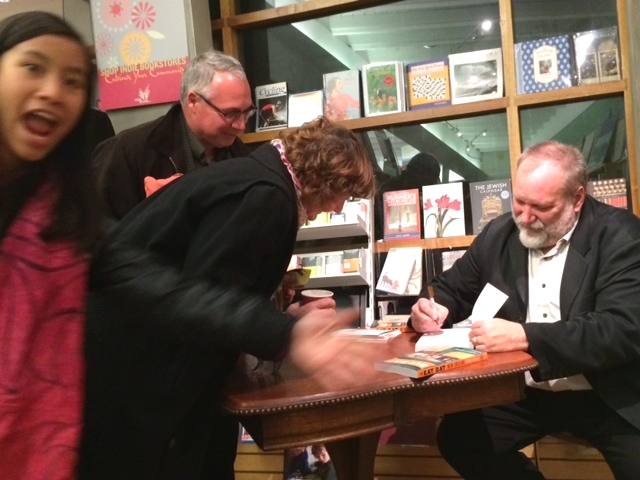 At
At  Congratulations to
Congratulations to  On Sunday, April 6, 5-8 p.m., Brazos plans another party, to "raise a glass with our patrons and partners to 40 more years of bookselling excellence"; cocktails, light refreshments and music will be available.
On Sunday, April 6, 5-8 p.m., Brazos plans another party, to "raise a glass with our patrons and partners to 40 more years of bookselling excellence"; cocktails, light refreshments and music will be available.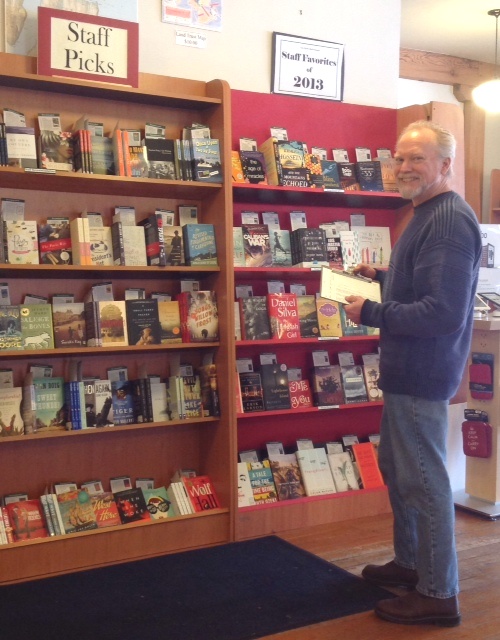 Here's a lovely first: John Willson, a poet and a bookseller at Eagle Harbor Book Company, Bainbridge Island, Wash., has been selected as a 2014 Island Treasure by the Bainbridge Island Arts & Humanities Council. The award honors "excellence in the arts and/or humanities by two individuals each year who have made outstanding contributions in those areas on the Bainbridge Island community" and comes with a $4,000 prize.
Here's a lovely first: John Willson, a poet and a bookseller at Eagle Harbor Book Company, Bainbridge Island, Wash., has been selected as a 2014 Island Treasure by the Bainbridge Island Arts & Humanities Council. The award honors "excellence in the arts and/or humanities by two individuals each year who have made outstanding contributions in those areas on the Bainbridge Island community" and comes with a $4,000 prize. Where the Locals Go: More than 300 Places Around the World to Eat, Play, Shop, Celebrate, and Relax
Where the Locals Go: More than 300 Places Around the World to Eat, Play, Shop, Celebrate, and Relax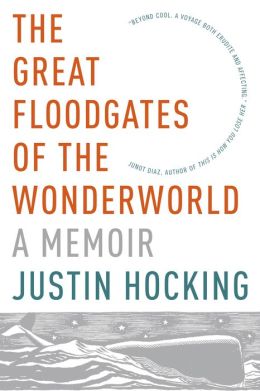 Justin Hocking contracted a disease in college: "I became obsessed with a book about obsession." In The Great Floodgates of the Wonderwold, he writes about poet Charles Olson talking to a colleague about Herman Melville's Moby-Dick: "I see... THE WHTE DEATH... has descended... upon YOU... too." Like many others--including Frank Stella, Laurie Anderson, Tony Kushner and David Foster Wallace--Hocking comes under its spell. (The very title of the memoir comes from its pages.)
Justin Hocking contracted a disease in college: "I became obsessed with a book about obsession." In The Great Floodgates of the Wonderwold, he writes about poet Charles Olson talking to a colleague about Herman Melville's Moby-Dick: "I see... THE WHTE DEATH... has descended... upon YOU... too." Like many others--including Frank Stella, Laurie Anderson, Tony Kushner and David Foster Wallace--Hocking comes under its spell. (The very title of the memoir comes from its pages.)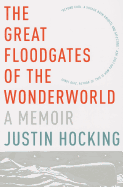
 When registration opened last November 16 for BookPeople's two literary summer camp programs this year, some parents camped out overnight at the store in Austin, Tex., to make sure their children got a spot. Camp Half-Blood, BookPeople's flagship camp program--based on Rick Riordan's Percy Jackson & the Olympians series and in its ninth year--sold out all seven of its week-long sessions within hours. The other camp, the Ranger Corp Training Camp, based on the Ranger's Apprentice series by John Flanagan, which has been around since 2008, is nearly sold out. With 100 kids in a session, altogether BookPeople signed up some 800 children for this coming summer's camps. Each spot costs $450.
When registration opened last November 16 for BookPeople's two literary summer camp programs this year, some parents camped out overnight at the store in Austin, Tex., to make sure their children got a spot. Camp Half-Blood, BookPeople's flagship camp program--based on Rick Riordan's Percy Jackson & the Olympians series and in its ninth year--sold out all seven of its week-long sessions within hours. The other camp, the Ranger Corp Training Camp, based on the Ranger's Apprentice series by John Flanagan, which has been around since 2008, is nearly sold out. With 100 kids in a session, altogether BookPeople signed up some 800 children for this coming summer's camps. Each spot costs $450. Each session, and each summer, follows a tightly structured plotline based on the respective book series upon which the camps are based. Every activity the campers are involved in--from hiking and swimming to archery and lessons on Greek and Roman mythology--ties back into that session's story. The programs also feature actors, some of whom double as counselors, along with elaborate costumes and sets. The Camp Half-Blood program has gone on long enough to have a counselor-in-training program for teens aged 16-18, and there are graduates of that program who now work as counselors.
Each session, and each summer, follows a tightly structured plotline based on the respective book series upon which the camps are based. Every activity the campers are involved in--from hiking and swimming to archery and lessons on Greek and Roman mythology--ties back into that session's story. The programs also feature actors, some of whom double as counselors, along with elaborate costumes and sets. The Camp Half-Blood program has gone on long enough to have a counselor-in-training program for teens aged 16-18, and there are graduates of that program who now work as counselors.
 He consulted with a camp director friend to get the basics of running a camp that was safe and fit within state regulations, but otherwise didn't look to camping professionals for advice or for a template to follow. "I've since found out from other camps that what we do flies in the face of what everybody thought could work," he said. "I've been told again and again that it shouldn't work, that these themed camp things don't last."
He consulted with a camp director friend to get the basics of running a camp that was safe and fit within state regulations, but otherwise didn't look to camping professionals for advice or for a template to follow. "I've since found out from other camps that what we do flies in the face of what everybody thought could work," he said. "I've been told again and again that it shouldn't work, that these themed camp things don't last."
